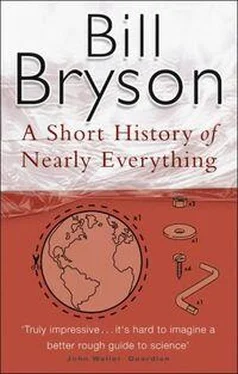Perhaps uniquely among human beings, the younger Haldane found World War I “a very enjoyable experience” and freely admitted that he “enjoyed the opportunity of killing people.” He was himself wounded twice. After the war he became a successful popularizer of science and wrote twenty-three books (as well as over four hundred scientific papers). His books are still thoroughly readable and instructive, though not always easy to find. He also became an enthusiastic Marxist. It has been suggested, not altogether cynically, that this was out of a purely contrarian instinct, and that if he had been born in the Soviet Union he would have been a passionate monarchist. At all events, most of his articles first appeared in the Communist Daily Worker .
Whereas his father’s principal interests concerned miners and poisoning, the younger Haldane became obsessed with saving submariners and divers from the unpleasant consequences of their work. With Admiralty funding he acquired a decompression chamber that he called the “pressure pot.” This was a metal cylinder into which three people at a time could be sealed and subjected to tests of various types, all painful and nearly all dangerous. Volunteers might be required to sit in ice water while breathing “aberrant atmosphere” or subjected to rapid changes of pressurization. In one experiment, Haldane simulated a dangerously hasty ascent to see what would happen. What happened was that the dental fillings in his teeth exploded. “Almost every experiment,” Norton writes, “ended with someone having a seizure, bleeding, or vomiting.” The chamber was virtually soundproof, so the only way for occupants to signal unhappiness or distress was to tap insistently on the chamber wall or to hold up notes to a small window.
On another occasion, while poisoning himself with elevated levels of oxygen, Haldane had a fit so severe that he crushed several vertebrae. Collapsed lungs were a routine hazard. Perforated eardrums were quite common, but, as Haldane reassuringly noted in one of his essays, “the drum generally heals up; and if a hole remains in it, although one is somewhat deaf, one can blow tobacco smoke out of the ear in question, which is a social accomplishment.”
What was extraordinary about this was not that Haldane was willing to subject himself to such risk and discomfort in the pursuit of science, but that he had no trouble talking colleagues and loved ones into climbing into the chamber, too. Sent on a simulated descent, his wife once had a fit that lasted thirteen minutes. When at last she stopped bouncing across the floor, she was helped to her feet and sent home to cook dinner. Haldane happily employed whoever happened to be around, including on one memorable occasion a former prime minister of Spain, Juan Negrín. Dr. Negrín complained afterward of minor tingling and “a curious velvety sensation on the lips” but otherwise seems to have escaped unharmed. He may have considered himself very lucky. A similar experiment with oxygen deprivation left Haldane without feeling in his buttocks and lower spine for six years.
Among Haldane’s many specific preoccupations was nitrogen intoxication. For reasons that are still poorly understood, beneath depths of about a hundred feet nitrogen becomes a powerful intoxicant. Under its influence divers had been known to offer their air hoses to passing fish or decide to try to have a smoke break. It also produced wild mood swings. In one test, Haldane noted, the subject “alternated between depression and elation, at one moment begging to be decompressed because he felt ‘bloody awful’ and the next minute laughing and attempting to interfere with his colleague’s dexterity test.” In order to measure the rate of deterioration in the subject, a scientist had to go into the chamber with the volunteer to conduct simple mathematical tests. But after a few minutes, as Haldane later recalled, “the tester was usually as intoxicated as the testee, and often forgot to press the spindle of his stopwatch, or to take proper notes.” The cause of the inebriation is even now a mystery. It is thought that it may be the same thing that causes alcohol intoxication, but as no one knows for certain what causes that we are none the wiser. At all events, without the greatest care, it is easy to get in trouble once you leave the surface world.
Which brings us back (well, nearly) to our earlier observation that Earth is not the easiest place to be an organism, even if it is the only place. Of the small portion of the planet’s surface that is dry enough to stand on, a surprisingly large amount is too hot or cold or dry or steep or lofty to be of much use to us. Partly, it must be conceded, this is our fault. In terms of adaptability, humans are pretty amazingly useless. Like most animals, we don’t much like really hot places, but because we sweat so freely and easily stroke, we are especially vulnerable. In the worst circumstances-on foot without water in a hot desert-most people will grow delirious and keel over, possibly never to rise again, in no more than six or seven hours. We are no less helpless in the face of cold. Like all mammals, humans are good at generating heat but-because we are so nearly hairless-not good at keeping it. Even in quite mild weather half the calories you burn go to keep your body warm. Of course, we can counter these frailties to a large extent by employing clothing and shelter, but even so the portions of Earth on which we are prepared or able to live are modest indeed: just 12 percent of the total land area, and only 4 percent of the whole surface if you include the seas.
Yet when you consider conditions elsewhere in the known universe, the wonder is not that we use so little of our planet but that we have managed to find a planet that we can use even a bit of. You have only to look at our own solar system-or, come to that, Earth at certain periods in its own history-to appreciate that most places are much harsher and much less amenable to life than our mild, blue watery globe.
So far space scientists have discovered about seventy planets outside the solar system, out of the ten billion trillion or so that are thought to be out there, so humans can hardly claim to speak with authority on the matter, but it appears that if you wish to have a planet suitable for life, you have to be just awfully lucky, and the more advanced the life, the luckier you have to be. Various observers have identified about two dozen particularly helpful breaks we have had on Earth, but this is a flying survey so we’ll distill them down to the principal four. They are:
Excellent location.We are, to an almost uncanny degree, the right distance from the right sort of star, one that is big enough to radiate lots of energy, but not so big as to burn itself out swiftly. It is a curiosity of physics that the larger a star the more rapidly it burns. Had our sun been ten times as massive, it would have exhausted itself after ten million years instead of ten billion and we wouldn’t be here now. We are also fortunate to orbit where we do. Too much nearer and everything on Earth would have boiled away. Much farther away and everything would have frozen.
In 1978, an astrophysicist named Michael Hart made some calculations and concluded that Earth would have been uninhabitable had it been just 1 percent farther from or 5 percent closer to the Sun. That’s not much, and in fact it wasn’t enough. The figures have since been refined and made a little more generous-5 percent nearer and 15 percent farther are thought to be more accurate assessments for our zone of habitability-but that is still a narrow belt. [29]
To appreciate just how narrow, you have only to look at Venus. Venus is only twenty-five million miles closer to the Sun than we are. The Sun’s warmth reaches it just two minutes before it touches us. In size and composition, Venus is very like Earth, but the small difference in orbital distance made all the difference to how it turned out. It appears that during the early years of the solar system Venus was only slightly warmer than Earth and probably had oceans. But those few degrees of extra warmth meant that Venus could not hold on to its surface water, with disastrous consequences for its climate. As its water evaporated, the hydrogen atoms escaped into space, and the oxygen atoms combined with carbon to form a dense atmosphere of the greenhouse gas CO 2. Venus became stifling. Although people of my age will recall a time when astronomers hoped that Venus might harbor life beneath its padded clouds, possibly even a kind of tropical verdure, we now know that it is much too fierce an environment for any kind of life that we can reasonably conceive of. Its surface temperature is a roasting 470 degrees centigrade (roughly 900 degrees Fahrenheit), which is hot enough to melt lead, and the atmospheric pressure at the surface is ninety times that of Earth, or more than any human body could withstand. We lack the technology to make suits or even spaceships that would allow us to visit. Our knowledge of Venus’s surface is based on distant radar imagery and some startled squawks from an unmanned Soviet probe that was dropped hopefully into the clouds in 1972 and functioned for barely an hour before permanently shutting down.
Читать дальше












